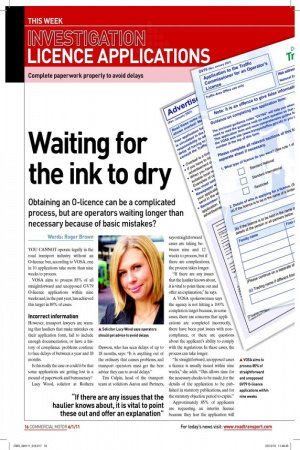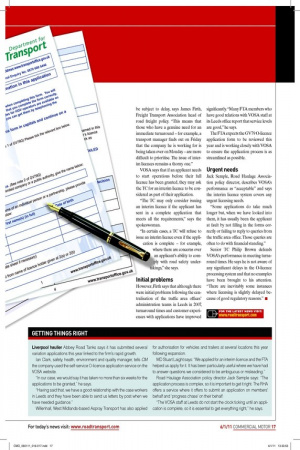Waiting for the ink to dry
Page 14

Page 15

If you've noticed an error in this article please click here to report it so we can fix it.
Obtaining an O-licence can be a complicated process, but are operators waiting longer than necessary because of basic mistakes?
Words: Roger Brown
YOU CANNOT operate legally in the road transport industry without an O-licence but, according to VOSA, one in 10 applications take more than nine weeks to process.
VOSA aims to process 85% of all straightforward and unopposed GV79 O-licence applications within nine weeks and, in the past year, has achieved this target in 89% of cases.
Incorrect information
However, transport lawyers are warning that hauliers that make mistakes on their application form, fail to include enough documentation, or have a history of compliance problems continue to face delays of between a year and 18 months.
Is this really the case or could it be that some applications are getting lost in a mound of paperwork and bureaucracy?
Lucy Wood, solicitor at Rothera Dawson, who has seen delays of up to 18 months, says: “It is anything out of the ordinary that causes problems, and transport operators must get the best advice they can to avoid delays.” Tim Culpin, head of the transport team at solicitors Aaron and Partners, says straightforward cases are taking be tween nine and 12 weeks to process, but if there are complications, the process takes longer.
“If there are any issues that the haulier knows about, it is vital to point these out and offer an explanation,” he says.
A VOSA spokeswoman says the agency is not hitting a 100% completion target because, in some cases, there are concerns that applications are completed incorrectly, there have been past issues with noncompliance, or there are questions about the applicant’s ability to comply with the regulations. In these cases, the process can take longer.
“In straightforward, unopposed cases a licence is usually issued within nine weeks,” she adds. “This allows time for the necessary checks to be made, for the details of the application to be published in statutory publications, and for the statutory objection period to expire.” Approximately 85% of applicants are requesting an interim licence because they fear the application will be subject to delay, says James Firth, Freight Transport Association head of road freight policy. “This means that those who have a genuine need for an immediate turnaround – for example, a transport manager inds out on Friday that the company he is working for is being taken over on Monday – are more dificult to prioritise. The issue of interim licences remains a thorny one.” VOSA says that if an applicant needs to start operations before their full licence has been granted, they may ask the TC for an interim licence to be considered as part of their application.
“The TC may only consider issuing an interim licence if the applicant has sent in a complete application that meets all the requirements,” says the spokeswoman.
“In certain cases, a TC will refuse to issue an interim licence even if the application is complete – for example, where there are concerns over an applicant’s ability to comply with road safety undertakings,” she says.
Initial problems
However, Firth says that although there were initial problems following the centralisation of the trafic area ofices’ administration teams in Leeds in 2007, turnaround times and customer experiences with applications have improved signiicantly. “Many FTA members who have good relations with VOSA staff at its Leeds ofice report that service levels are good,” he says.
The FTA expects the GV79 O-licence application form to be reviewed this year and is working closely with VOSA to ensure the application process is as streamlined as possible.
Urgent needs
Jack Semple, Road Haulage Association policy director, describes VOSA’s performance as “acceptable” and says the interim licence system covers any urgent licensing needs.
“Some applications do take much longer but, when we have looked into them, it has usually been the applicant at fault by not illing in the forms correctly or failing to reply to queries from the trafic area ofice. Those queries are often to do with inancial standing.”
Senior TC Philip Brown defends VOSA’s performance in meeting turnaround times. He says he is not aware of any signiicant delays in the O-licence processing system and that no examples have been brought to his attention. “There are inevitably some instances where licensing is slightly delayed because of good regulatory reasons.” ■














































